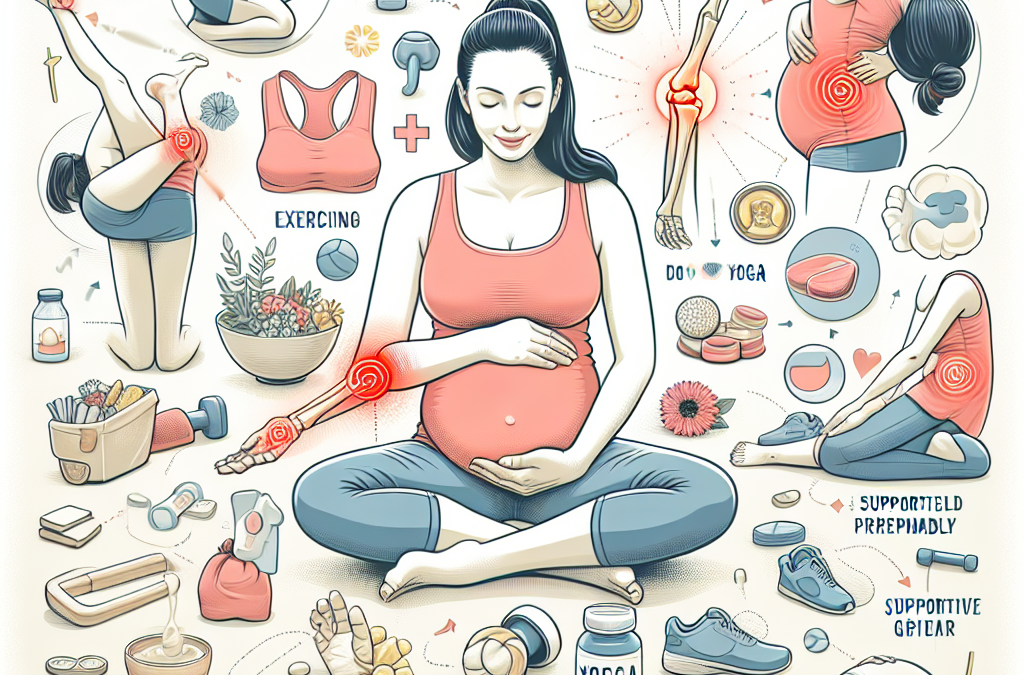Understand Your Body’s Changes
Recognize the Causes
When I got pregnant, I was amazed at how much my body was changing. Joint pain became a regular visitor, and understanding why it happens was crucial for me. Hormonal changes, particularly the increase in relaxin, softens ligaments, which can sometimes lead to instability and pain in our joints. That was a real eye-opener and set the stage for what I needed to do.
Also, as your body begins to grow a little bundle of joy, the added weight naturally puts extra stress on your joints. I noticed it especially in my knees and hips. Knowing that this is a common experience helped me feel less alone and more prepared to address it. Ignoring these pains isn’t an option, so embracing this knowledge was my first step toward relief.
Finally, it’s essential to recognize that different women may experience varying levels of discomfort depending on their body types and lifestyle habits. This variation reminded me to listen to my body and consult with medical professionals whenever I had doubts about my symptoms.
Maintain Physical Activity
Choose the Right Exercises
Okay, I’ll be the first to admit – exercise might not be the first thing on your mind during pregnancy, especially if you’re dealing with joint pain. But trust me, gentle, low-impact activities can be a game changer. Swimming, for instance, was my favorite. That buoyancy can relieve pressure on your joints while giving you a fantastic workout. Plus, it felt so freeing!
Yoga and stretching are fantastic, too. They helped me maintain flexibility and strength without overdoing it. I found fantastic prenatal yoga classes that focused on safe poses for tired joints, often led by instructors who understood our struggles.
Lastly, something as simple as a brisk walk can offer major relief. It’s free, requires no special equipment, and can do wonders for your mood while keeping your joints moving. Always be gentle with yourself, though; listen to your body and take breaks if needed.
Support Your Joints
Use Proper Footwear
I can’t emphasize enough how crucial the right footwear can be! If you’re like me and love comfy shoes, be sure they provide adequate support. I learned the hard way that wearing flat sandals for too long was not my friend. A good pair of sneakers or supportive sandals made a massive difference in how my feet and joints felt at the end of the day.
The Best Joint Support (Naturally) Starts with Organic Nutritional Support!
Get 40% Off Here ...
Orthotic inserts were another fantastic investment for me. Something as simple as a cushy insert can help redistribute pressure on your feet and reduce stress on your knees and hips. I couldn’t believe how much better I felt just by adding those to my shoes!
Also, consider supportive compression socks. Sounds fancy, right? But trust me, they can enhance blood flow and reduce pain in your legs, which in turn helps with overall joint pain. I was surprised by how much easier my day-to-day activities felt when I started using them regularly.
Manage Stress Levels
Practice Mindfulness and Relaxation Techniques
Let’s face it, pregnancy can be a wonderfully exciting but also super stressful time. Stress can make joint pain feel even worse, so finding ways to unwind is essential. I discovered mindfulness meditation, and it really helped me focus on my body and its needs. It’s all about being kind to yourself.
Good Joint Health Requires Good Nutrition Health. Click Here for More Info
Practicing deep-breathing exercises became my go-to. When I felt that pang of discomfort, taking a moment to breathe deeply helped calm my mind and body. It might sound simple, but it’s super effective. Integrating these techniques into my daily routine proved magical.
Additionally, don’t forget the power of relaxation! Taking warm baths with Epsom salts was my ultimate treat at the end of the day, easing my muscle tension while promoting joint relaxation. It’s amazing how a little self-care can go a long way.
Seek Professional Help
Consult Healthcare Providers
I can’t stress this enough: don’t hesitate to reach out to your doctor or a physical therapist. They can help you assess your joint pain and develop strategies tailored to your needs. When I finally made that call, it was like a weight had been lifted since they provided me with exercises designed specifically for my pain level.
Overall, physical therapists were a fantastic resource for guidance. They offered hands-on treatments and suggestions to improve flexibility and strength safely during pregnancy. Each appointment left me feeling empowered and armed with knowledge.
Lastly, keep in mind that sometimes joint pain can signal a more serious issue, so never brush it off. Understanding when to seek help was one of the best decisions I made during my pregnancy journey.
FAQs
1. What are the common causes of joint pain during pregnancy?
Common causes include hormonal changes, added weight, and muscle strain as your body accommodates your growing baby. Understanding these factors can help you better manage the discomfort.
2. Is it safe to exercise with joint pain during pregnancy?
Yes, as long as you engage in low-impact exercises and listen to your body. Activities like swimming and prenatal yoga are often recommended.
3. How can proper footwear help with joint pain?
Wearing supportive shoes can reduce the strain on your joints by providing better alignment and cushioning. It’s important to choose comfort as a priority!
4. What relaxation techniques can alleviate stress and pain?
Mindfulness meditation, deep-breathing exercises, and warm baths are great ways to relax your body and mind, thereby potentially easing joint discomfort.
5. When should I consult a healthcare provider about my joint pain?
Consult a healthcare provider if you experience persistent or severe pain, if it’s affecting your daily life, or if you have concerns about your overall health during pregnancy.




